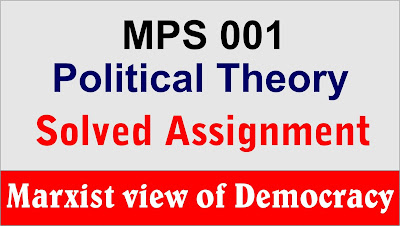(B) Marxist View of Democracy
In Marxist theory, a replacement democratic society will
arise through the organised actions of a world labor enfranchising the whole
population and freeing up humans to act without being bound by the labour
market. There would be little, if any, need for a state, the goal of which was
to enforce the alienation. Marx and Engels stated within the CommunistManifesto and later works that "the initiative within the revolution by
the labor , is to boost the proletariat to the position of upper class , to win
the battle for democracy" and universal suffrage, being "one of the
primary and most vital tasks of the militant proletariat".
As Marx wrote in his Critique of the Gotha Program,
"between capitalist and communist society there lies the amount of the
revolutionary transformation of the one into the opposite . like are often
"> this is often also a political transition period during which the
state can be nothing but the revolutionary dictatorship of the
proletariat". He allowed for the likelihood of peaceful transition in some
countries with strong democratic institutional structures (such as Britain, the
US and therefore the Netherlands), but suggested that in other countries during
which workers can't "attain their goal by peaceful means" the
"lever of our revolution must be force", stating that the working
people had the proper to revolt if they were denied political expression.
During the revolutionary ferment of the Russian Revolution of
1905 and 1917, there arose working-class grassroots attempts of direct
democracy with Soviets (Russian for "council"). consistent with Lenin
and other theorists of the Soviet Union , the soviets represent the democratic
will of the labor and are thus the embodiment of the dictatorship of the
proletariat. Lenin and therefore the Bolsheviks saw the soviet because the basic
organizing unit of society during a communist system and supported this type of
democracy. Thus, the results of the long-awaited Constituent Assembly election
in 1917, which Lenin's Bolshevik Party lost to the Socialist Revolutionary
Party, were nullified when the Constituent Assembly was disbanded in January
1918.
Marx mentioned democracy because the ideal goal of social
dialectics in his earliest writings. He maintained that the overall will cf the
"real" people is embodied within the actions of the state.
"Democracy is that the solution of the riddle of all constitutions. Here
the constitution is... constantly rcduccd to the important men, the important
people, and posited as their own work". With the abolition of classes
under the proletarian dictatorship, the state ceases to serve class interests.
It becomes transformed into an instrument of the "real" people — a
Marxian variant of Rousseau's general will, consistent with Alfred Meyer. But
as soon as this is often accomplished there's not a requirement for political
institutions, because once the interests of the community and therefore the
interests of the individual coincide, the necessity for a state, within the
role of an arbitrator, disappears. the overall will can express itself
directly, without the help of political institutions. Consequently political
democracy will vanish along side the vanishing state.
The Marxists envision democracy in a perfect communist
society not as a political but as a social order. the belief of communism is
amid a simultaneous change in attribute , which with the disappearance of
classes becomes depoliticized. Under communism, man becomes truly free and
sovereign over himself; only then is he ready to master nature and to cease
being its servant.
Previous Section
Next Question
WhatsApp Contact : 8130208920
ignou mps assignment 2020-21 







